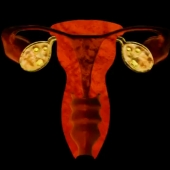A baby's brain grows rapidly during the last trimester of pregnancy, triples in size during the first year after birth, and continues to develop rapidly throughout the first 2 years of life. Fat makes up more than half of the brain's dry weight.
A primary fat in nerve cells of the developing and infant brain is docosahexaenoic acid or DHA. One important role for DHA is as a component of myelin, which covers nerve fibers. Myelin ensures that nerve impulses move quickly and correctly. With less myelin, impulses travel more slowly, delaying movement of information from one cell to the next.
There is also a high concentration of DHA in the junctions between nerve cells. Nerve cells communicate across these junctions, called synapses. Peak formation of synapses begins at 34 weeks' gestation and continues through the first 24 months of life.
DHA is also a primary component of nerve cells in the retina, the light-sensitive tissue lining the inner surface of the eye. DHA is a member of the family of omega-3 fatty acids. Essential fatty acids or EFA's must be obtained from your diet. Cold water fish, a traditional source of dietary DHA, get DHA from algae in their diet.
However, many fish today are farm-raised and fed corn and soy meal and only wild salmon and trout consistently supply DHA. Breast milk, unlike cow's milk, contains a significant amount of DHA. Levels depend on the mother's diet. Other good sources are foods fortified with algal-DHA - which comes directly from algae,--and algal-DHA supplements.
- 895 views













